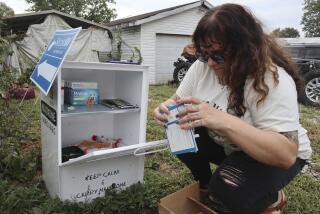Rapper Sirah is leading a movement to better understand mental health in the music community
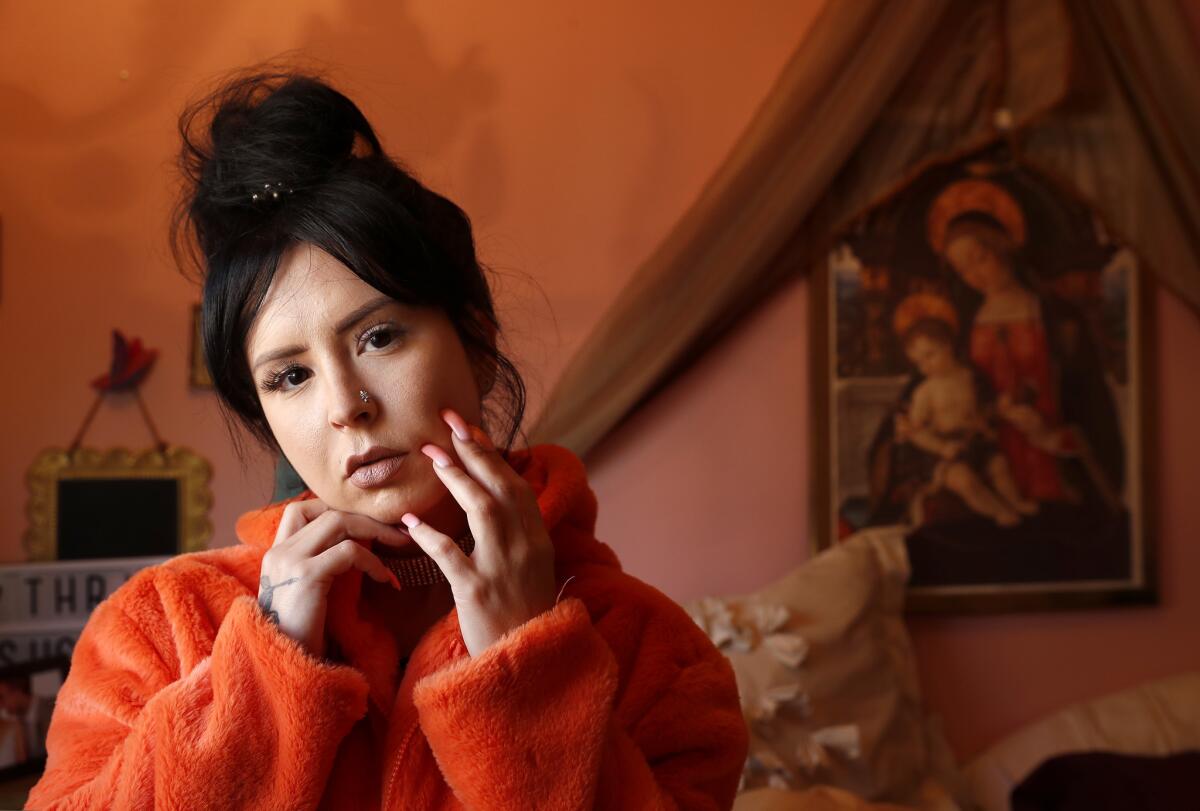
- Share via
There are plenty of rap songs about Promethazine, Percocet and Xanax — all prescription drugs with a high potential for addiction and abuse — but very few about the pill commonly prescribed to treat depression.
Last year, though, rapper Sirah released “Zoloft,” an Auto-Tuned track with such decidedly unglamorous lyrics as “You’re popping pills / I’m just trying to live.”
Sirah says she wrote “Zoloft” not just to smash taboos about mental health but also as a response to the drug overdose deaths of many of her friends.
“I talk about what a struggle it is to be surrounded by people who are dying,” says the L.A. rapper born Sara Elizabeth Mitchell, 30, a recovering drug user with 13 years of sobriety. “I’m struggling with mental health because everyone around me is struggling with Xanax.”
Sirah, who is also a certified peer-to-peer recovery coach, has become an influential advocate in the music industry, helping others navigate issues of mental health and addiction. Recently, she was named to the board of directors at the nonprofit Young People in Recovery; in January, she spoke about overdose prevention at the Echoplex during the first in a series of gatherings intended to encourage tough conversations within the nightlife community.
The informal events — a second meeting was held in April and a third is set for June 30 at the Echoplex — are publicized through the organizers’ individual social media accounts, some of which have tens of thousands of young followers. The meetings were started by DJ and artist Brittney Scott, along with friends Adam Weiss, one of the promoters behind the nightlife series Ham on Everything, and Morgan Freed, a co-founder of the popular Echo Park dance series Emo Night. Model-filmmaker Emily Kretzer is also involved in this effort.
They initially were spurred by the overdose death in November of 21-year-old rapper Lil Peep, a friend of the organizers who performed at Weiss’ Ham on Everything party. Lil Peep’s death, from a combination of drugs including Xanax and Fentanyl, drew national attention to prescription pill abuse, particularly among young people in the rap scene.
Weiss and Freed say they also felt compelled to organize the community meetings because of their jobs throwing parties and music events where they often see twentysomethings visibly and — perhaps even dangerously — intoxicated.
At the April meeting, as thousands of music fans were flocking to parties and concerts at the Coachella Valley Music and Arts Festival in Indio, a small group of Sirah’s peers were gathering at a much more intimate venue in Los Angeles.
It was 1 p.m., and there weren’t any bands scheduled to play at the Echoplex at the moment. The crowd of mostly twentysomethings eating pizza and sitting cross-legged on the stage was there for something else: group support. .
“Do you guys feel OK? Is this stage awkward?” asked Scott, who sat on a metal stool in cutoff overalls unfastened on one side.
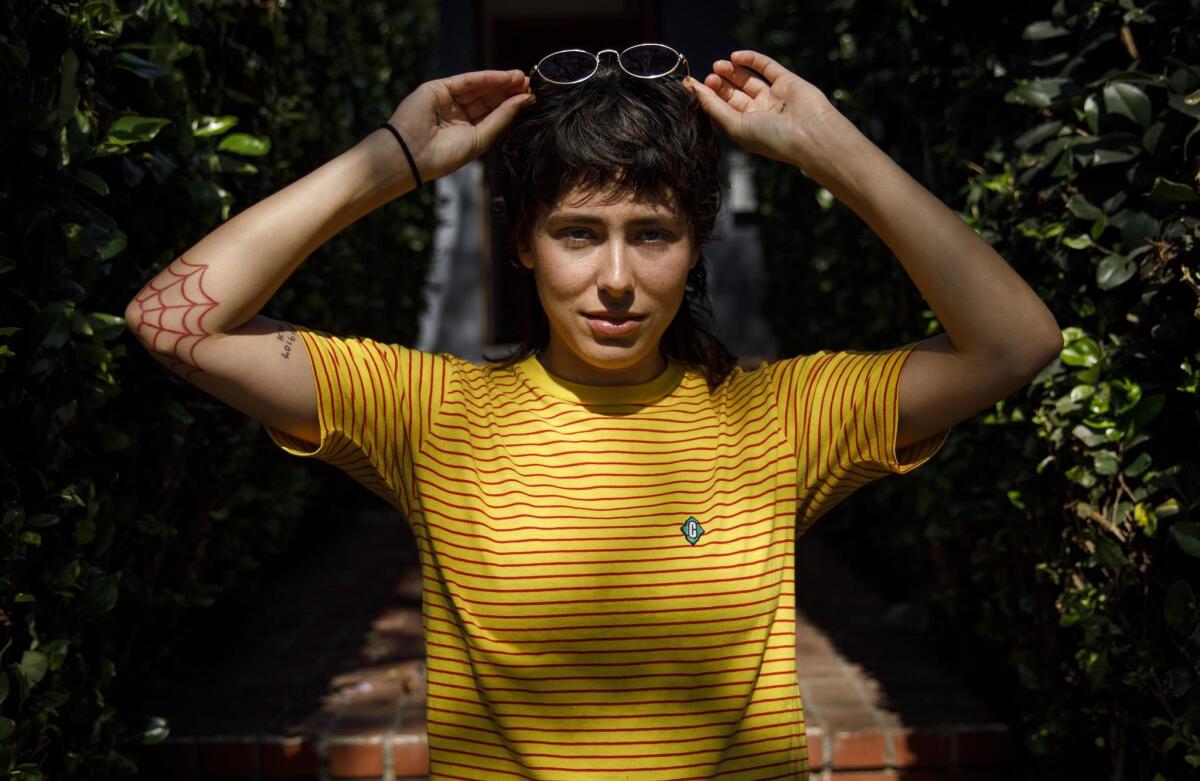
It was a reasonable question, considering that feelings — including those of awkwardness and anxiety — were the topic of the gathering, which aimed at offering a frank, open discussion about depression and shattering stigmas associated with it.
Speakers included Vans Warped Tour founder Kevin Lyman, who recently developed an app to reward recovering drug users for their continued sobriety, and writer Crissy Milazzo, who started an online spreadsheet with information about affordable therapy providers. Nobody claimed to be an expert, but those there had plenty of personal experience to draw from on topics rarely discussed in a nightclub setting.
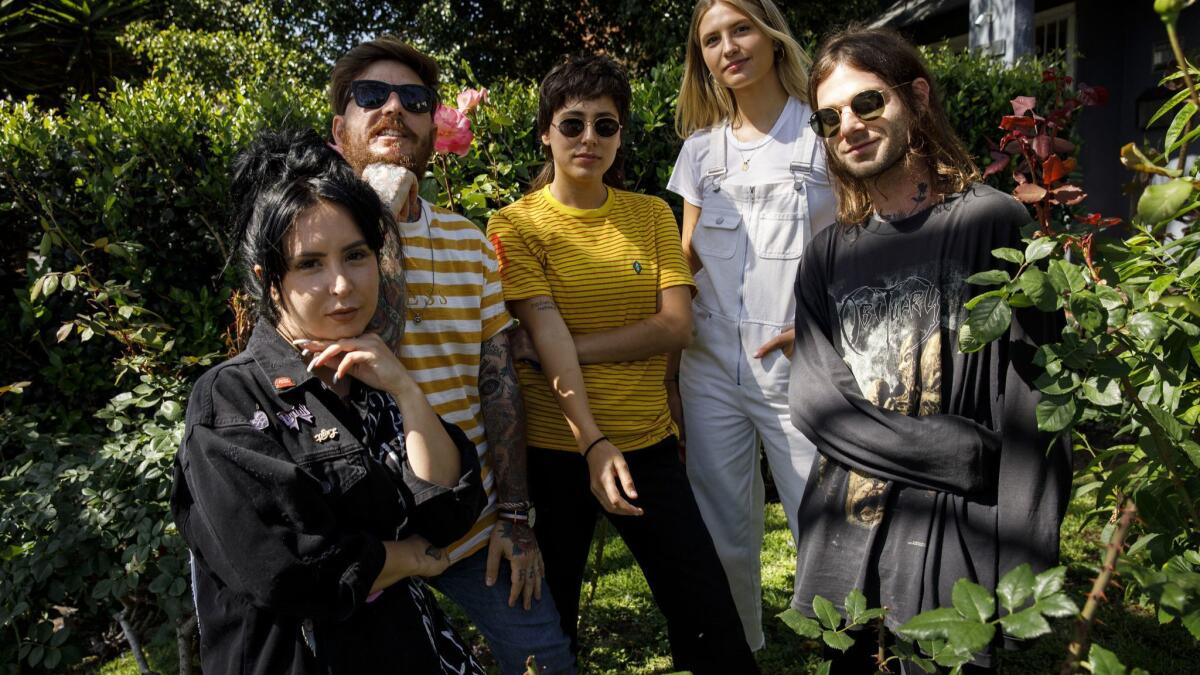
“I’m sober and off drugs and alcohol for many years. Obviously, that used to be something that used to help me cope with depression or anxiety,” said the tattooed Weiss, who sat onstage wearing a T-shirt bearing the word “Wholesome” in the same font as the Whole Foods logo. “Just because you get sober doesn’t mean that your depression goes away. As a matter of fact, it means now you have to work on other things to cope.”
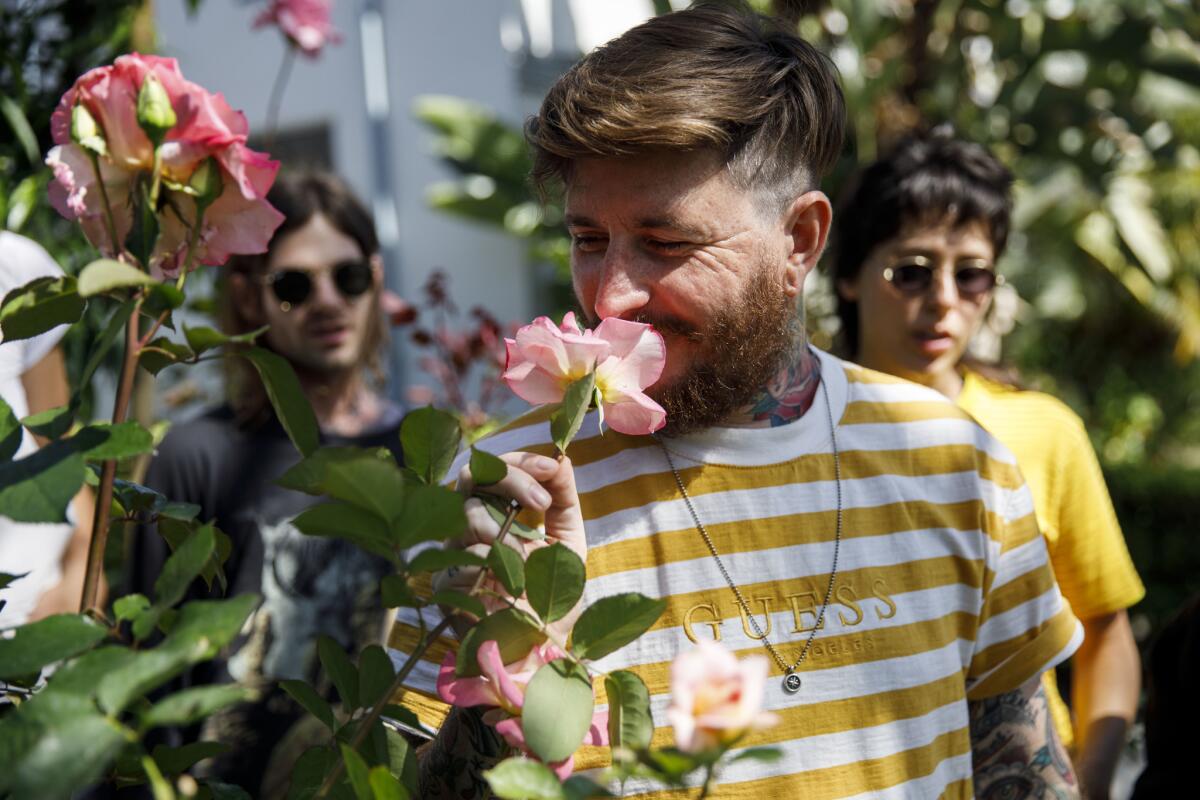
Rather than just preach sobriety, the organizers enlist recovery experts with the national nonprofit Facing Addiction. One of the topics at the meeting was the overdose prevention drug Naloxone, which became available without a prescription in California in 2015.
Freed had never heard of Naloxone before paramedics used it to revive him after an overdose that nearly killed him. He’s been sober since, but said his lack of education at the time of his drug use spoke to the broader need for these community workshops.
“It feels good to be able to see a room full of people come together and become friends, and then they’ll be connected with each other after they leave,” he said. “They’ll see each other at these parties we throw, and then if something happens, they’ll have an idea of how to handle it.”
Unlike established nonprofits or even 12-step programs, the community meetings at the Echoplex are aimed at attracting a crowd of music fans who might not otherwise consider themselves drug addicts in need of counseling. Freed said he’s already seen a huge response since the first meeting.
He said he regularly gets social media messages from strangers looking for advice about quitting drugs or alcohol. “I had no idea how much people really needed to hear this until we did that and made it like an OK thing for people to be like, ‘Yeah, I’m not good, and I don’t know what to do,’” Freed said.
Sirah said she hopes that the meetings encourage young people to ask for help when they need it and that they show that even the most seemingly successful people sometimes struggle with mental health issues.
“It’s so crucial to let people know that, yeah, I’ve won a Grammy and I’ve done really well and I’ve been rapping and I have songs with Demi [Lovato] and Skrillex and Lupe Fiasco, but like right now, I’ve got depression,” said Sirah.
“And that’s OK. That’s life.”
Although Sirah and her fellow organizers acknowledge that the problem is much bigger than they have the resources to tackle, their short-term goal is simple: “Accountability within our community,” says Freed. “It’s all we can do. We’re just using all the platforms that we have to try and make this as open and as easily accessible for people.”
While Xanax is typically prescribed to treat anxiety and panic disorders, it’s become so entrenched in rap culture as a recreational drug that popular artists from Future to Migos to Lil Uzi Vert frequently reference it in their songs. Twenty-one-year-old rapper Lil Xan even named himself after the medication, which can have euphoric effects in high doses.
It can also be deadly, particularly when counterfeit versions are laced with the synthetic opioid fentanyl, which is cheaper to produce. The pervasiveness of fentanyl has helped propel drug overdoses into the leading cause of death among Americans under age 50.
“People don’t realize right now it’s not just drug addicts dying from fentanyl overdoses. It’s everybody,” Sirah says. “This isn’t your parents’ heroin. We’re dealing with a completely different beast right now.”
She knows better than most: Her father died of a heroin overdose when she was 12. “By the age of 7, I was getting him drug money, selling peppermint patties, going to the pawn shop, just doing whatever I could to get him drugs,” says Sirah, who wears a peach-colored sweat suit, her messy black hair pulled up in a topknot. “Deadbeat,” the song she released with Skrillex late last year, is a tribute to him.
Along with “Zoloft,” it’s one of several of her songs that gets candid about drug abuse and depression, which she says often go hand in hand but aren’t talked about nearly enough.
On a recent afternoon, she was sitting in the living room of her one-bedroom apartment in East Hollywood, where she frequently records up-and-coming rappers from her taxidermy-filled bedroom and takes in homeless kids who need a place to stay. She has a soft spot for them, not least of all because she was once one of them, sleeping at Union Station when she found herself homeless as a teen. She’d moved to Los Angeles to avoid being placed in foster care after her father’s death, but ended up, she says, “cooking crystal meth and selling guns and running drugs.”
Having gotten clean through a 12-step program at age 17, Sirah calls her training to become a certified peer-to-peer recovery coach “the only education I got.”
She’s spent the last decade life coaching, doing motivational speaking and quietly helping musicians, rappers and pop stars get clean behind the scenes.
Sirah is hopeful that the industry is beginning to change its formerly carefree attitude about drugs. She cites Lil Uzi Vert’s tweets suggesting he’d started a drug detox and Lil Pump denouncing Xanax in an Instagram post as signs of progress after Lil Peep’s death.
And in April, Eminem — who once rapped about “blue and yellow purple pills” — tweeted in honor of his 10 years of recovery.
“Drugs have killed a lot of our favorite artists,” Sirah says. “I think we’re tired of it.”
ALSO
This crowd gets emotional: It’s emo night Taking Back Tuesday
More to Read
The biggest entertainment stories
Get our big stories about Hollywood, film, television, music, arts, culture and more right in your inbox as soon as they publish.
You may occasionally receive promotional content from the Los Angeles Times.

